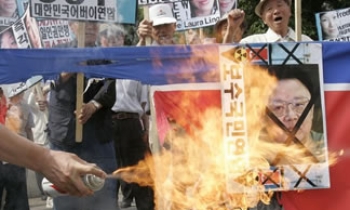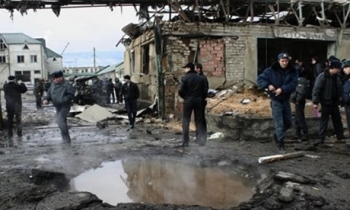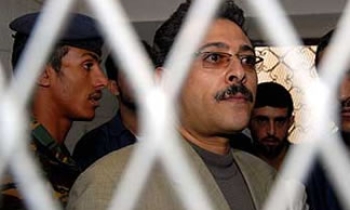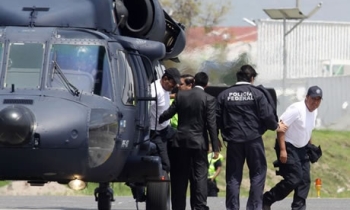PRESIDENT Gloria Macapagal-Arroyo does not understand or appreciate the role of press freedom in Philippine society, the Freedom Fund for Filipino Journalists (FFFJ) said yesterday.
In a strongly worded statement sent to the Inquirer ahead of World Press Freedom Day today, the group said Filipino journalists still had "reason to worry" despite the lifting of Presidential Proclamation No. 1017, which imposed a weeklong state of national emergency in February.
It said the Arroyo administration had "failed to take strong steps to stop violence against journalists and media practitioners who work in the community press," and pointed out that in 2005 alone, seven journalists were killed without any of the assailants landing in jail.
"Clearly, the actions of President Arroyo reflect her failure to understand and appreciate press freedom as a core value of Philippine society. The pressure exerted on [Probe Productions and the Philippine Center for Investigative Journalism] indicates a concern that has little to do with encouragement of rebellion," the group said.
"As a nation that had previously endured a dictatorship, we should condemn any move toward the suppression of democratic rights and liberties," it said.
The FFFJ said last week that Probe Productions had received a warning from the National Telecommunications Commission (NTC) for airing an interview with rebel soldier 1st Lieutenant Sonny Sarmiento.
At the time, Justice Secretary Raul Gonzalez himself ordered the National Bureau of Investigation to look into the supposed liability of the show's producers in the interview.
Gonzalez said there was "a thin line" between "freedom of the press and the press being used to propagate the cause of rebellion."
But, according to the FFFJ, "there is a thin line that separates legitimate complaint against irresponsible journalism and intolerance for scrutiny and public evaluation."
It also pointed out that a few weeks ago, Jonathan Tiongco, who has connections to Ms Arroyo's chief of staff, Michael Defensor, had applied for a warrant to search the offices of the PCIJ.
It quoted PCIJ staff members as saying that their office had "suddenly become the subject of inquiries from strangers asking about their office hours and whereabouts."
76 killed since '86
Jose Torres, spokesperson of the National Union of Journalists in the Philippines (NUJP), said 76 journalists had been killed while working in the line of duty since 1986.
"Even if fewer journalists have died this year so far, this does not mean the threats to press freedom have eased. We should blame the President for these killings because it is her responsibility to take care of press freedom and implement laws to protect it," Torres said.
Said Vergel Santos of the Center for Media Freedom and Responsibility (CMFR): "The press has never been under siege as it is now. The media must come to the realization that our freedom is under attack. To preserve it, we must be more aggressive than ever. This is a government that is making life difficult for journalists. It decides for you when and what to say."
Santos said the number of journalists killed was sufficient evidence "that we are deeply threatened."
"Hardly anyone has been jailed for the crimes. By not doing anything, the Arroyo administration is just as culpable. It must cultivate a climate of freedom, but [it is] not doing this," he said.
Torres stressed that the prosecution of the killers of journalists and the police investigation of the cases should continue.
He said the media industry should also take stock of the salaries and benefits of its practitioners.
"There will be no real press freedom if working journalists remain poor and threats to their lives still abound," he said.
'Most dangerous country'
The New York-based Freedom House, a nonprofit, nonpartisan organization working for democracy and freedom around the world, said last week that press freedom "suffered setbacks in a number of important countries in Asia and Africa in 2005," including the Philippines.
It said in a survey report that the Philippines was only "partly free," with press freedom declining because of the continued "high level" of physical violence against journalists.
The International Press Institute, a global network of editors, media executives and leading journalists dedicated to the safeguarding of press freedom, among other things, also said the Philippines was "the most dangerous country, and its government appears to be encouraging violence by failing to properly investigate the murders."
But two of the President's allies in Congress, Eastern Samar Representative Marcelino Libanan and Davao del Sur Representative Douglas Cagas, yesterday said the report of Freedom House was "unfair and inaccurate."
Cagas said press freedom was freely exercised in the country, "as shown by unrestricted media reports" on alleged wrongdoing in the government.
Libanan said the fact that critics of the President and the press could "liberally criticize" the Arroyo administration proved that press freedom was "very much alive in the country."
But they acknowledged the urgent need to solve the media killings.
"In the first place, the government is not responsible for these killings. But we call on the [Philippine National Police] to work double-time to solve these killings and prosecute those responsible," Cagas said.
Still, House Minority Leader Francis Escudero said the Freedom House report proved the claim of the opposition that the country was under "undeclared martial rule."
"The media should continue to stand firm and never be intimidated in reporting the true state of affairs in the country," he said.
House resolution
Members of the House of Representatives prepared to file today a resolution honoring journalists killed in the line of duty for keeping "the fire of democracy" alive.
In separate interviews, Representatives Robert Ace Barbers (Surigao del Norte), Imee Marcos (Ilocos Norte), Gilbert Remulla (Cavite), Juan Edgardo Angara (Aurora) and Joel Villanueva (CIBAC party) said the current generation of Filipinos should be grateful to print, broadcast and TV journalists who valiantly fight for freedom of expression and civil rights even during times of oppression.
Marcos is the principal author of the resolution, but the other lawmakers said they would endorse it or file similar measures today.
According to Barbers, "a frightened media is comparable to the era of barbarians."
He called on the public to remember "those who have fallen" just to preserve the democratic way of life.
Said Villanueva: "It should be [a conscious effort of every Filipino] to be grateful to them. Journalists are like soldiers who go to war risking their lives to make sure the people continue to enjoy freedom, and like our soldiers, they should be accorded full honors."









